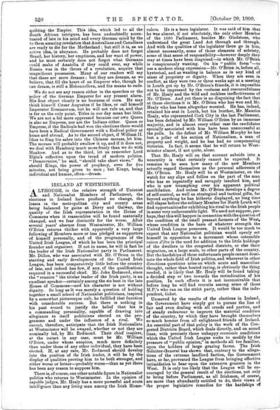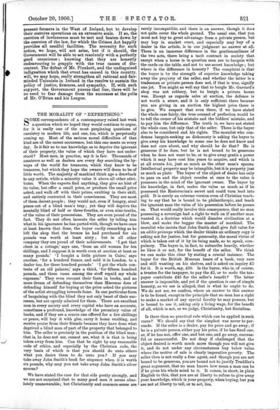IRELAND AT WESTMINSTER. A LTHOUGH, in the relative strength of Unionist
and Nationalist Members of Parliament, the elections in Ireland have produced no change, the losses, in the metropolitan city and county areas being balanced by gains at Derry and Galway, the quality, of the Irish representation in the House of Commons when it reassembles will be found materially changed, and we fear distinctly for the worse. After several years' absence from Westminster, Mr. William O'Brien returns thither with apparently a very large following of Members more or less pledged as supporters of himself personally, and of the programme of the United Irish League, of which he has been the principal founder and organiser. If not in name, he will in fact be the leader of the Irish Nationalist party in Parliament. Mr. Dillon, who was associated with Mr. O'Brien in the starting and early developments of the United Irish League, has been comparatively little before the country of late, and indeed has few, if any, of the qualifications required in a successful chief. Mr. John Redmond, since the " reunion " the titular leader of the Irish party, is an excellent speaker—certainly among the six best in the late House of Commons—and his character is not without dignity. So long as it was merely a question of holding together a small school of Nationalist politicians, inspired by a somewhat picturesque cult, he fulfilled that function with considerable success. But there is nothing in his past record to justify the belief that his is a commanding personality, capable of drawing into allegiance to itself politicians elected on the pro- gramme and under the influence of a rival. We cannot, therefore, anticipate that the Irish Nationalists at Westminster will be swayed, whether or not they are nominally led, by Mr. Redmond. Their chief inspirer, at the outset in any case, must be Mr. William O'Brien, under whose auspices, much more definitely than under those of any other individual, they have been elected. If, at any rate, Mr. Redmond should develop into the position of the Irish leader, it will be by the display of qualities proving him to be both stronger, and either worse or better—probably worse—than as yet there has been any reason to suppose him.
There is, of course, one other notable figure in Nationalist politics who returns to Westminster. In the opinion of capable judges, Mr. Healy has a more powerful and acute iutelligeuce than any living man among the Irish Home- rulers. He is a born legislator. It was said of him that he was almost, if not absolutely, the only other Member of the 1880 Parliament, besides Mr. Gladstone, who understood the great Land Act through and through. And with the qualities of the legislator there go in him, almost necessarily, some of those elements of sobriety, some of that sense of responsibility—however deeply they may at times have been disguised—in which Mr. O'Brien is conspicuously wanting. On his "public form "—to use a modern slang expression—Mr. O'Brien is, before all, hysterical, and as wanting in balance as in any kind of sense of propriety or dignity. When they are seen in conflict, as they were two or three weeks ago at a meeting in Louth got up by Mr. O'Brien's friends it is impossible not to be impressed by the coolness and resourcefulness of Mr. Healy and the wild and reckless ineffectiveness of Mr. O'Brien. And yet there is no disguising the fact that at these elections it is Mr. O'Brien who has won and Mr.
Healy who has been altogether worsted. He has, indeed, retained his seat in Louth, but his brother, Mr. Maurice Healy, who represented Cork City in the last Parliament, has been defeated by Mr. William O'Brien by an immense majority, and in almost every other case the candidates specially associated with him have been unsuccessful at the polls. In the defeat of Mr. William Murphy he has lost a pillar of his section of Nationalism, a man. of property and weight, and he has had no compensating victories. In fact, it seems that he will return to West- minster almost, if not quite, alone.
That Mr. Healy will on that account subside into a nonentity is what certainly cannot be expected. It remains to be seen how many of the new Members actually regard themselves as the personal adherents of Mr. O'Brien. Mr. Healy will be at Westminster, on the watch for any slips and follies on the part of the man who has so repeatedly and savagely insulted him, and who is now triumphing over his apparent political annihilation. And unless Mr. O'Brien develops a degree of self-control, as well as strategical and tactical gifts, far beyond anything he has hitherto displayed, no long time will elapse before the solitary Member for North Louth will find opportunities for exhibiting his rival to the Irish people in some very unfavourable light. We need not suppose, per- haps, that this will happen in connection with the question of the condition of the small peasant farmers of the West, whose condition is the basis of whatever strength the United Irish League possesses. It would be too much to expect that any Nationalist politician would openly set himself in opposition to a movement whose ostensible raison d'être is the need for addition to the little holdings of the dwellers in the congested districts or else their migration, on a large scale, to other parts of the country. But the hardships of these unfortunate people cannot domi- nate the whole field of Irish politics, and wherever in other directions questions arise on which acute and masculine thought, rather than heated raving, is obviously the thing needed, it is likely that Mr. Healy will be found taking a decided step or two towards the revindication of his position. In such 'efforts it is not inconceivable that before long he will find recruits among some of those M.P.'s who ran on the strict party, rather than the inde- pendent, ticket.
Unmoved by the results of the elections in Ireland, the Government have simply got to pursue the line of fair and even dealing with all creeds and parties, and of steady endeavour to improve the material condition of the country, by which they have brought themselves so much honour from all enlightened friends of Ireland. An essential part of that policy is the work of the Con- gested Districts Board, which deals directly, and on sound lines, with precisely those unhappy economic conditions which the United Irish League seeks to modify by the pressure of "public opinion," in methods all too familiar, upon the holders of large grazing farms. The Irish Solicitor-General has shown that, contrary to the allega- tions of the extreme landlord faction, the Government have, so far, prevented the League from bringing effective intimidation to bear upon the extensive graziers in the West. It is only too likely that the League will be en- couraged by the general result of the elections, not only to bring before Parliament, as all Irishmen, of course, are more than abundantly entitled to do their views of the proper legislative remedies for the hardships cif
peasant farmers in the West of Ireland, but to develop their coercive operations on an extensive scale. If so, the coercion of lawlessness must be met and beaten down by the coercion of the law, for which the Crimes Act happily provides all needful facilities. The necessity for such action, we hope, will not arise, but if it should, the Government will be able to act resolutely with a perfectly good conscience ; knowing that they are honestly endeavouring to grapple with the true causes of dis- content. The defeat of Mr. Plunkett, and the undisguised indignation which that event has caused in this country. will, we may hope, really strengthen all rational and fair- minded Unionists in Ireland in the resolve to sustain the policy of justice, firmness, and sympathy. If, with such support, the Government pursue that line, there will be no need to fear damage from the successes at the polls of Mr. O'Brien and his League.







































 Previous page
Previous page